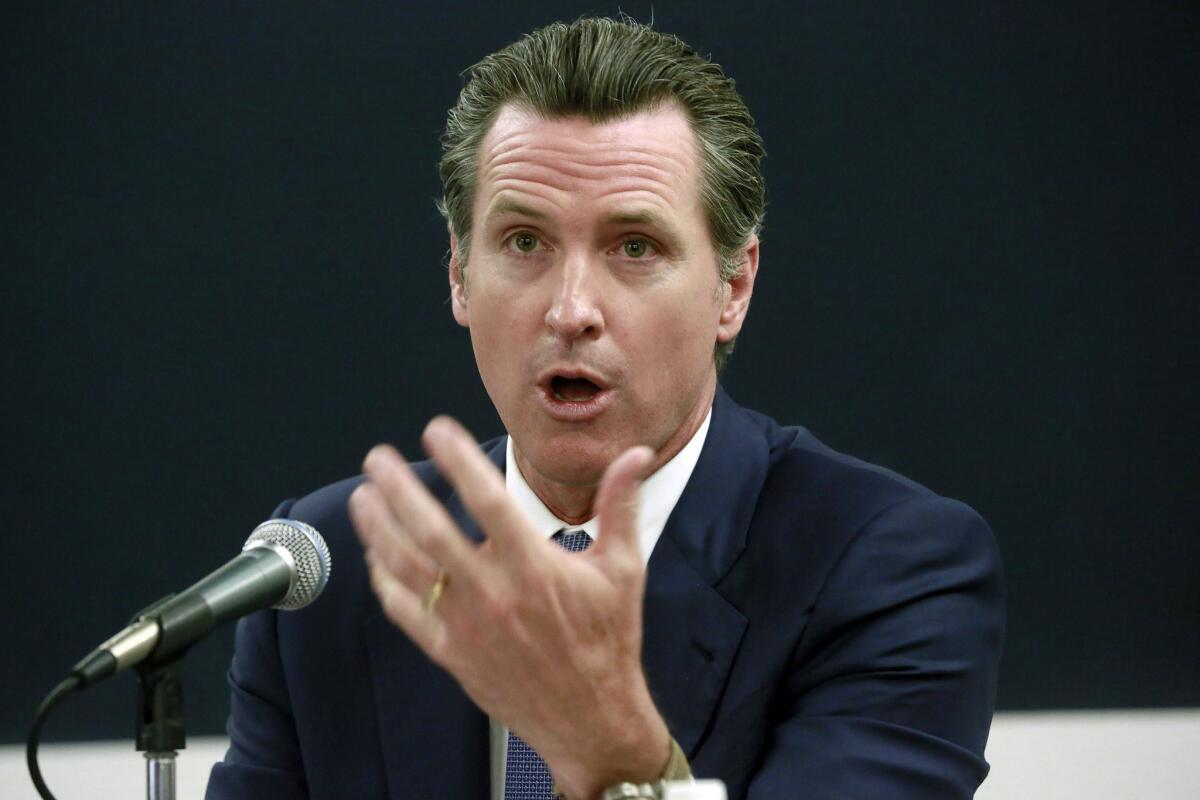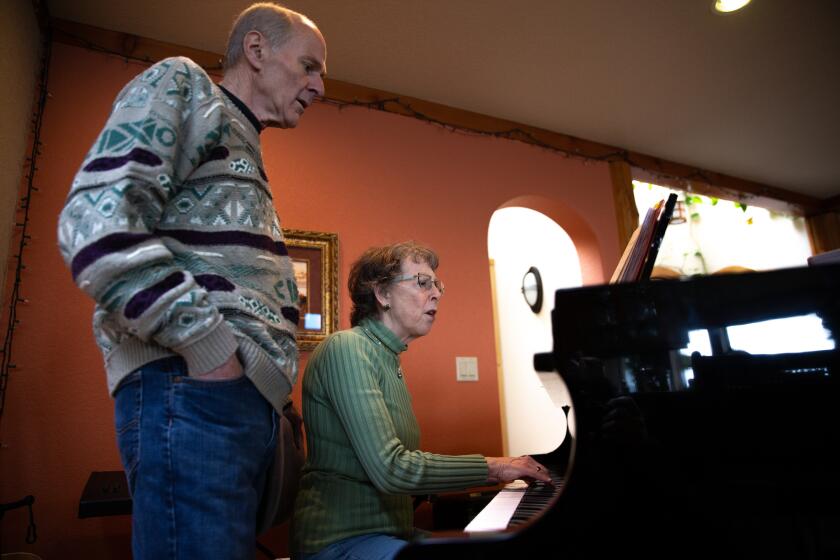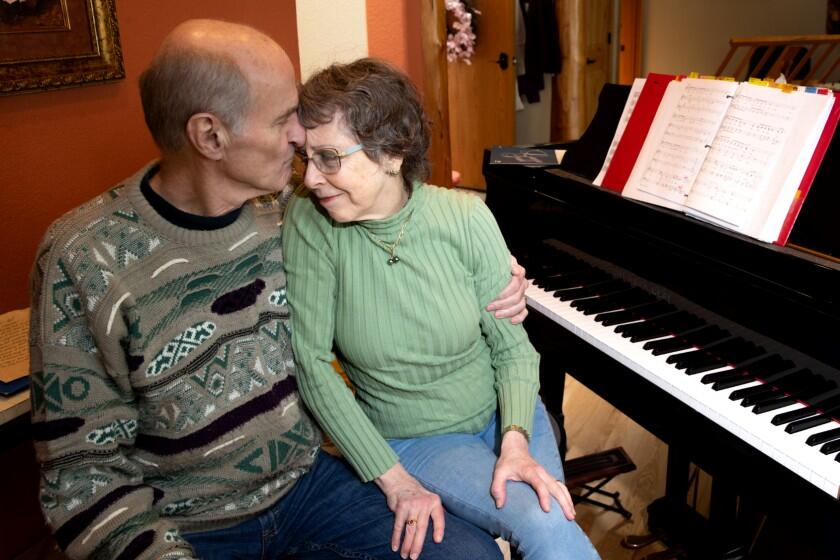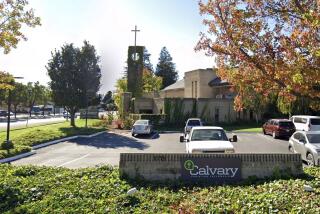Three California churches sue Newsom over singing ban

- Share via
Three churches in Northern California have filed a federal lawsuit against Gov. Gavin Newsom, claiming a ban on singing in places of worship — implemented to help stem the spread of the coronvirus — violates their 1st Amendment rights.
“Singing in church is a biblical mandate,” said Kevin Green, pastor of Calvary Chapel in Fort Bragg.
Churches, like all facilities in the state deemed nonessential, were closed in March amid the governor’s stay-at-home orders at the beginning of the pandemic. But as restrictions were eased and more sectors of the economy reopened, houses of worship were allowed to welcome worshipers, beginning in May, provided they adhered to health and safety protocols, which limited attendance and, at the time, discouraged singing.
Since then, however, as the virus has surged across the state and Newsom enacted a second shutdown in much of California, the governor further tamped down on acceptable activities at church, specifying that “places of worship must ... discontinue indoor singing and chanting activities.”
The deadly outbreak among members of a choir has stunned health officials, who have concluded that the virus was almost certainly transmitted through the air from one or more people without symptoms.
The suit, filed Wednesday in U.S. District Court in Redding, focuses on Newsom’s support of recent Black Lives Matter protests, many of which were prompted by the death of George Floyd while in custody of Minneapolis police. The plaintiffs — Green’s church, along with Calvary Chapel in Ukiah and the River of Life Church in Oroville — say the governor has protected protesters’ freedom of expression, but not that of churchgoers.
“It’s the inconsistency,” Green said.
“He wasn’t singling out the church until he got to that singing thing,” he said of the governor’s latest orders, issued July 6. “When a man is that inconsistent, I can’t believe him, and that’s why we filed the suit.”
The lawsuit argues that Newsom has specifically targeted churches as spaces where singing and chanting are not allowed, but he hasn’t placed the same restrictions on other locations that remain open, such as shopping malls, child-care centers, and TV and film production locations.
“Banning singing in California churches is an unconstitutional abuse of power, and to do it in the name of a pandemic is despicable,” said Jordan Sekulow, one of the plaintiffs, whose father, Jay Sekulow, is a member of President Trump’s legal team. “This ban is clearly targeted at religion.”
Court records cite the governor’s endorsement of the recent Black Lives Matter protests as an example of his inconsistency when it comes to freedom of speech and crowds gathering, noting that “on or about June 5, 2020, Newsom tweeted that protesters ‘have the right to protest peacefully,’ showing further support of mass protests.”
Tens of thousands have turned out across California to protest the death of Floyd and other Black Americans at the hands of police, many singing and chanting together as they marched in recent weeks. Some demonstrations even turned into giant dance parties.
Such disparities prompted the suit, which notes that singing is an integral part of church services.
“According to sincerely held religious beliefs and the commands of the Bible, plaintiffs hold weekly worship services that consist of various forms of worship, including singing, prayer, recitation of Scripture and a sermon preached by the pastor,” the document states.
The governor’s office could not immediately be reached for comment Thursday. The new guidance, released by the California Department of Public Health, notes that singing indoors can lead to an increase in coronavirus infection, even when proper social distancing is practiced.
Scientists studying tiny exhaled particles that could transmit the coronavirus say a Centers for Disease Control and Prevention decision to drop warnings against choral singing is dangerous, risking more “super spreading events” such as a Washington state choir practice linked to two deaths.
Researchers at the federal Centers for Disease Control and Prevention have found that the virus spreads through respiratory aerosols, which can float beyond six feet — the recommended distance to maintain to avoid spreading the disease. While singing, people are often breathing more deeply than they normally would, inhaling more of the air around them, further enhancing the risk of infection.
The lawsuit is not the first filed by places of worship against Newsom. In April, three Southern California churches sued Newsom and other state officials, arguing that stay-at-home orders that forced their closure violate the 1st Amendment right to freedom of religion and assembly. Later that month, a small evangelical church in Lodi filed a similar lawsuit, saying that a ban on gatherings was unconstitutional.
In late May, however, just days before Newsom relaxed restrictions that allowed houses of worship to reopen, the U.S. 9th Circuit Court of Appeals upheld the governor’s ban on in-person church services.
“We’re dealing here with a highly contagious and often fatal disease for which there presently is no known cure. In the words of Justice Robert Jackson, if a ‘[c]ourt does not temper its doctrinaire logic with a little practical wisdom, it will convert the constitutional Bill of Rights into a suicide pact,’ ” the justices wrote in a split decision on May 22.
Neither Mendocino County — where the two Calvary Chapel churches are located — nor Butte County, where the River of Life Church is, is currently on the state’s watchlist, which contains more than 30 counties facing extended restrictions from the state, including the closure of indoor church services.
But on Wednesday evening, Mendocino County officials announced the first coronavirus-related death and said it was likely the county would be added to the monitoring list in the next 48 hours. Because of that Dr. Noemi Doohan, the county’s public health officer, issued a revised order requiring the additional shutdown of indoor activities, including places of worship.
Green posted a notice on Calvary Chapel’s Facebook page, saying, “Due to Mendocino County orders, Calvary Chapel Fort Bragg will be suspending all public meetings once again until further notice.
“We will go back to live streaming our services again.”
More to Read
Sign up for Essential California
The most important California stories and recommendations in your inbox every morning.
You may occasionally receive promotional content from the Los Angeles Times.












